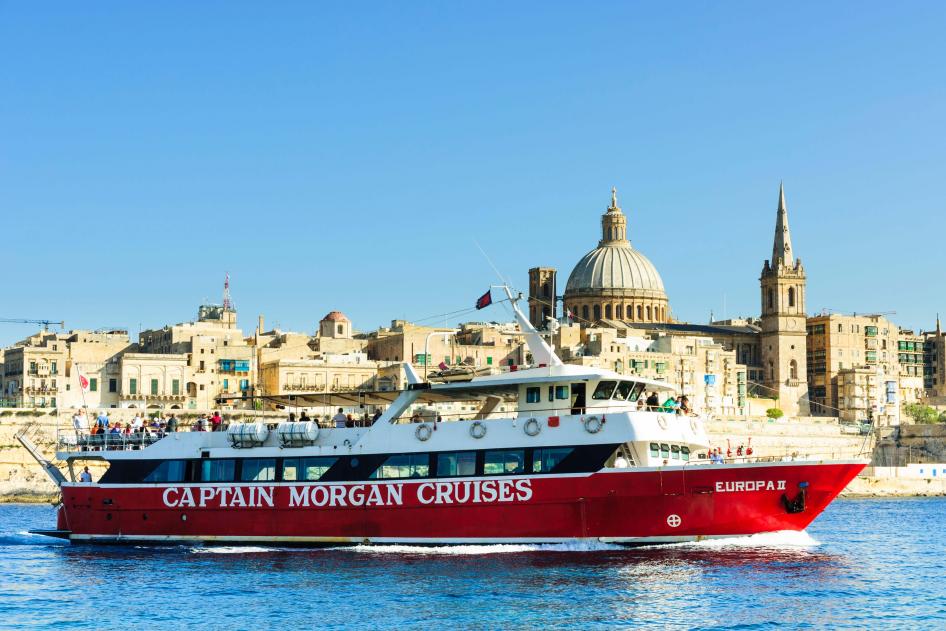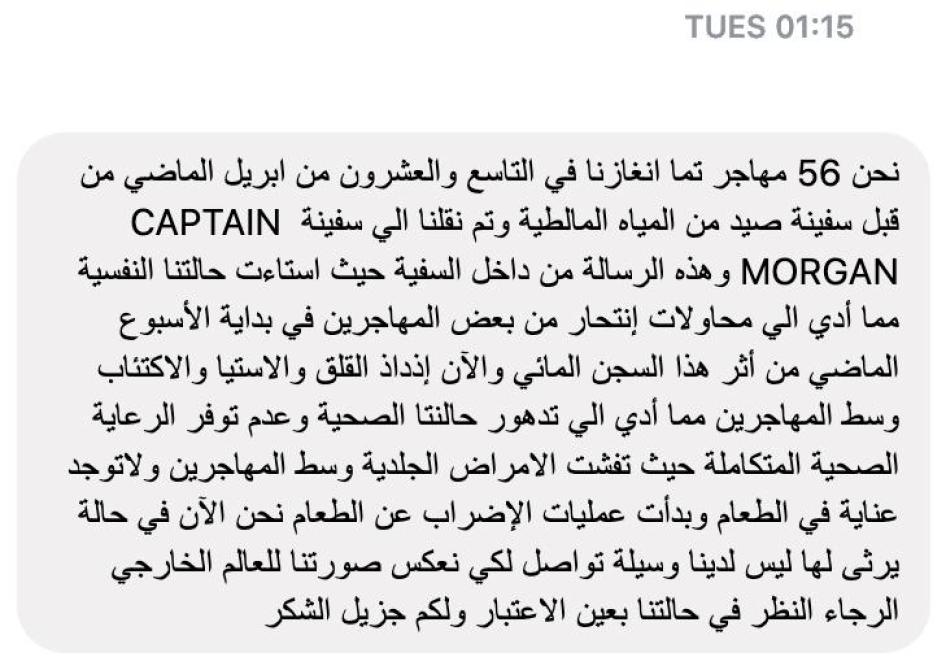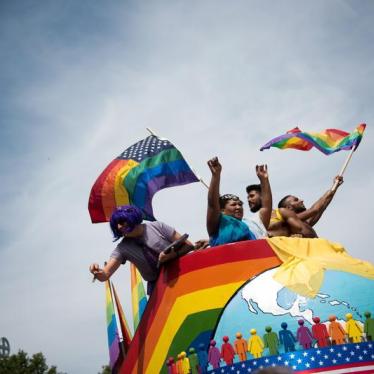Update: As of May 28, Malta was detaining 425 people on four tourist cruise boats just outside its territorial waters.
(Milan) – The Maltese government should immediately allow more than 160 people detained on two private tourism vessels just off Maltese territorial waters to disembark in Malta and seek asylum if they choose, Human Rights Watch said today.
Since April 30, 2020, the Maltese government has been paying a private company to keep people on the high sea on vessels designed for pleasure cruises. The government has not provided a legal basis, or legitimate purpose, for keeping people on these ferries, making this arbitrary deprivation of liberty.
“It’s incredible that the Maltese government would hold these people captive on tourist ferries in miserable conditions for weeks to pressure other EU countries to take them,” said Judith Sunderland, acting deputy Europe and Central Asia director at Human Rights Watch. “Concerns about Covid-19 and long-standing complaints, in part justified, about lack of fair sharing of responsibility can’t excuse this disgraceful behavior.”
France and Portugal have shown leadership and humanity in offering to relocate some of the men, and other European Union (EU) countries should follow their example, Human Rights Watch said.
The people were rescued at sea between April 30 and May 7. On April 30, the Maltese government arranged for the transfer of 57 people rescued the day before by a private fishing vessel to the Europa II, a 34.75-meter tourist ferry boat owned by Captain Morgan Cruises Ltd. On May 7, an Armed Forces of Malta patrol boat rescued 45 people and coordinated the rescue by a fishing boat of 78 people.
While all 18 women and children were reportedly taken ashore, the other 105 people were transferred the same day to the Bahari, a 23.59-meter tourist ferry boat owned by the same company. That group was subsequently transferred, on May 15, to the Atlantis, a 39.6-meter ferry boat owned by Captain Morgan Cruises. These boats, all flying the Maltese flag, are pleasure crafts designed for short tourist cruises and not to accommodate people for lengthy periods.
The government has not stated whether this is a mandatory quarantine to limit the potential spread of Covid-19, nor is it clear if it has carried out any public health measures, such as testing for Covid-19, isolating anyone with symptoms, and enabling social distancing. Even if it were intended as a quarantine, both groups have been on these boats for longer than the commonly mandated 14-day period.
Conditions on board, never appropriate, appear to be deteriorating significantly. On May 19, a man sent a Facebook post to the nongovernmental organization Alarm Phone, which runs a hotline for boats in distress in the Mediterranean, saying he is on board the Europa II and describing increasing despair in the “water prison.”
He said that some people had attempted suicide and that “anxiety, resentment, and depression have increased … this has made our health condition worse. Also due to lack of full health care, there’s been an outbreak of skin diseases … there is lack of care when it comes to food. Hunger strikes have started and we’re in a deplorable state. We have no means of communication to reflect our [condition] to the outside world.”
Alarm Phone was unable to reach the man for further communication, and no independent groups appear to have had any contact with anyone on the Europa II or the Atlantis. The government says it is spending €3,000 per day for each boat and has requested EU funds for these expenses.
In a letter to the European Commission, three Maltese organizations, Aditus Foundation, the Integra Foundation, and Jesuit Refugee Service Malta, said they are not aware of any effort by authorities to identify people with vulnerabilities or unaccompanied children, while no one on board has had access to lawyers, interpreters, or the United Nations (UN) refugee agency, UNHCR.
The Maltese government of Prime Minister Robert Abela has stated explicitly that it is keeping people at sea to pressure other EU countries to take them. A government spokesman said on April 30, “Our ports are closed. Now it’s up to the European Union to shoulder responsibility.”
Media reported that Foreign Minister Evarist Bartolo and Home Affairs Minister Byron Camilleri sent a letter to the European Commission on May 1 saying that EU countries had failed to live up to relocation pledges and asserting that the then-57 people on a Captain Morgan ferry would stay there “pending their relocation to other European countries.”
On April 9, the day after Italy declared its ports “unsafe” amid the Covid-19 pandemic, Malta went even further, announcing that Maltese authorities “are not in a position to guarantee the rescue of prohibited immigrants … nor to ensure the availability of a ‘safe place’ on the Maltese territory to any persons rescued at sea.”
Malta faces serious allegations in at least two incidents involving boats in distress in mid-April. A joint investigation by the Italian newspaper Avvenire and the UK newspaper the Guardian, based also on evidence collected by Alarm Phone, documented that the Armed Forces of Malta allegedly intercepted a boat carrying 101 people and instead of rescuing them, engaged in dangerous maneuvers, gave them some supplies and instructions at gunpoint, and told them to continue toward Italy.
On April 15, the privately-owned Dar al Salam 1, allegedly acting on orders from Malta, intercepted a boat carrying forty men, eight women, and three children, and returned them to Libya, where they were detained in the Tarik al Sikka detention center in Tripoli. On April 30, a former Maltese official told prosecutors investigating the allegations that he coordinated the pushback under instructions from the prime minister’s office as part of a long-standing role as liaison with Libyan authorities in the western part of the country. A reconstruction of the boat’s journey by Avvenire suggests that failure by the Maltese and EU authorities to respond to repeated distress alerts contributed to the deaths of at least five people, whose corpses were on board when the boat reached Libya. Seven others remain unaccounted for.
Malta has clear responsibilities under international law to respond to boats in distress at sea, enact or coordinate rescue operations within its search and rescue area, and ensure timely disembarkation at a safe port. Under international law, restrictions may be placed on rights for public health reasons, but they must be proportionate, nondiscriminatory, and based on available scientific evidence. The pandemic cannot justify abdicating rescue responsibilities or blanket bans on disembarkation, which puts the right to health of those on board at risk.
Deprivation of liberty without a legal basis is unlawful and arbitrary detention in contravention of international and European law. That the men are being held on private vessels in international waters does not absolve Malta of its responsibilities or its liabilities under international and European law. For the purposes of state responsibility, the men are in the custody and under the control of Maltese authorities. Denial of access to asylum contravenes the EU Charter of Fundamental Rights.
In a letter to Prime Minister Abela, the Council of Europe’s human rights commissioner said that the authorities should ensure prompt and safe disembarkation and investigate allegations of delay or non-response to situations of distress. The UN Office of the High Commissioner for Human Rights expressed concern in early May over reports of distress calls being ignored and reiterated that states should ensure search-and-rescue operations and swift disembarkation even amid the Covid-19 pandemic. On May 21, UNHCR and the International Organization for Migration (IOM) said that people on board the two boats should be brought to shore “as soon as possible,” stressing that it was “unacceptable to leave people at sea longer than necessary, especially under difficult and unsuitable conditions.”
This episode, reminiscent of numerous stand-offs at sea that were only resolved by ad hoc arrangements, makes an agreement among EU countries on a predictable system for disembarkation and relocation of migrants and refugees all the more urgent, Human Rights Watch said.
EU member states should not only relocate this group and follow through on prior commitments, but also strongly condemn the Maltese authorities for the arbitrary deprivation of liberty of scores of people and the violations of the law of the sea and of EU asylum standards, and urge Malta to allow the people to disembark. The European Commission should also open infringement proceedings against Malta for violating its EU treaty obligations.
“We believe the 160 people on board tourist cruise boats on the high sea are experiencing severe emotional and physical distress,” Sunderland said. “But we don’t believe their treatment, and violation of their rights, is worthy of the people of Malta, or any EU country.”









